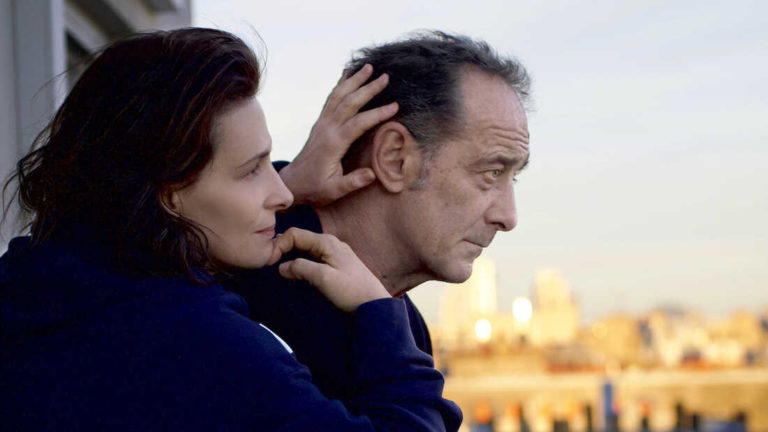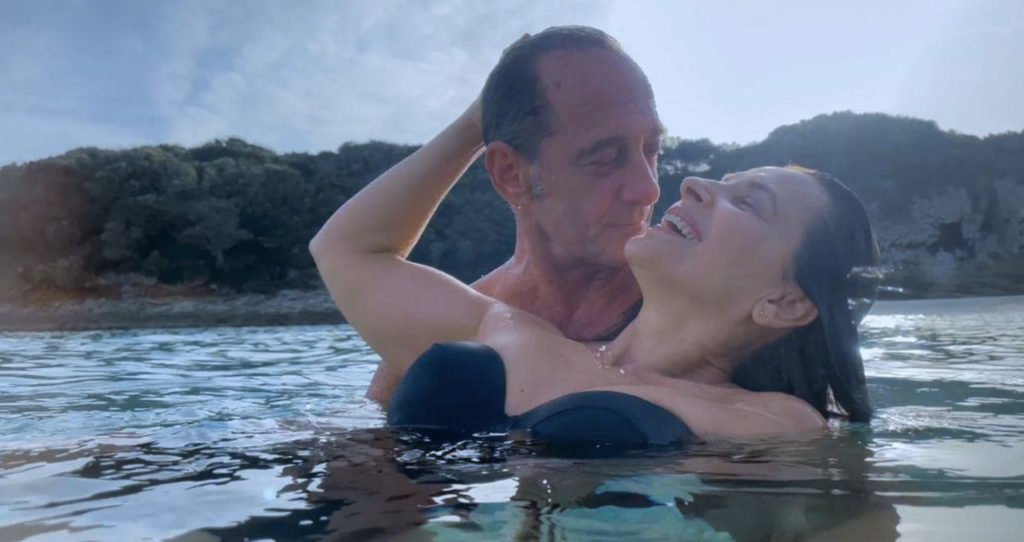
Since bursting onto the scene with her debut feature, Chocolat (1988), Claire Denis has largely been exploring the ins and outs of close knit relationships. Teaming up with Juliette Binoche for their third consecutive production together, Denis this time around delves into the complications of a relationship in the world of Covid-19. The events that follow could have/probably have happened in real life at any point in our lifetime, but the overbearing weight of our current situation appears as another character that just doesn’t seem to fully fit into this puzzle of love and pain.
Sara (Binoche) works as a radio DJ in Paris with her husband Jean (Vincent Lindon). The two recently were away for a seaside vacation, but upon their return to normal life, old problems begin to crop up and form a wedge between the two.
Sara first sees her old flame, François (Grégoire Colin) outside her office. She tells Jean about seeing him and they reminisce about how they met. Jean was François’s good friend when François and Sara were still dating. Jean also has to deal with getting work again as he was in prison and has been having a hard time getting back to normal life. That is, unti François offers Jean a job, coming back into both their lives.
At the same time Jean also is avoiding dealing with his son Marcus (Issa Perica)–who lives with Jean’s mother- being expelled from school and hanging out with the wrong crowd. All these issues brew into the perfect storm of damaged relationships.
Both Sides of the Blade is a hard movie to pin down. By the end you can argue that a clear statement is being made about making decisions based on more than what would be considered selfish or even typical standards. Yet, all the small pieces of each individual scenario feel disjointed.
The storyline of Jean, Marcus, and Jean’s mother feels almost intrusive to the storyline of Sara, Jean, and François. But that is real life. That is why these storylines are all present. But in the end, they feel more like they compete to help drive home a message than to congeal and coherently deliver one.

The majority of the film plays out more like a thriller than a drama. The fear and discomfort Sara feels when she sees François is more akin to seeing a stalker than an old acquaintance. He even lords over every preceding like he is a mad genius who can make anyone bend to his will with a clever sentence. And maybe that is the only place the Jean/Marcus plot helps play into the main plot as his focus on Marcus makes it easier for François to move in for the kill. In fact, it almost feels like Jean is helping François get back together with Sara at times.
Ultimately though, it felt like Sara was being let down by Denis in the end. She is someone who is easily manipulated and on one hand is a strong, smart individual, and on the other someone who lets everyone walk over her without a second thought. Pushing François off her after they already are naked in bed together, she breaks down again at the immediate instance of him playing the victim card. It was hard to get a beat on a clear vision Denis had for Sara as a character or even how the world of Covid was necessary for the picture. People walk around outside with their masks on and then when they are in a closed environment the main actors take the masks off to talk to someone else who is masked. There seems to be crossed lines that never get untangled.
Both Sides of the Blade only succeed by being held together by two of the most formidable actors of their time in Juliette Binoche and Vincent Lindon. And while it is easy to come to a conclusion on where all the storylines are necessary to one another, in the grand scheme of a full sit though, they still seem lost in the shuffle.
Final Grade: B-

